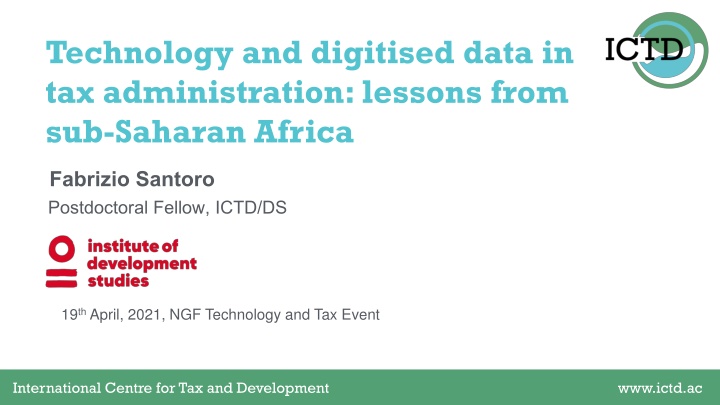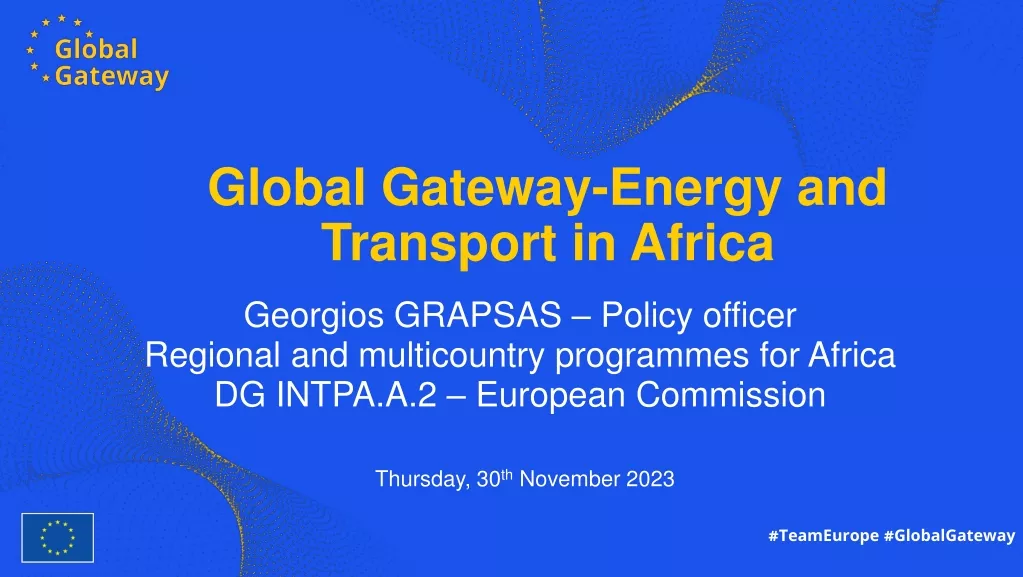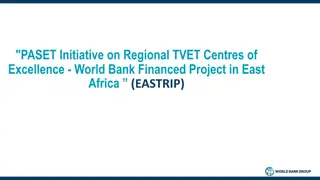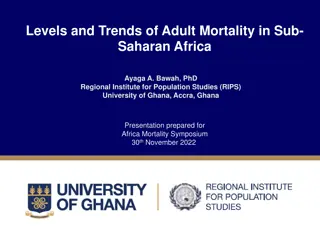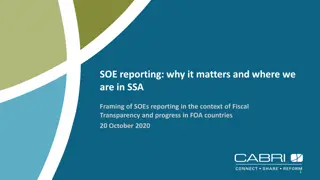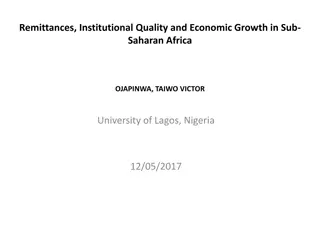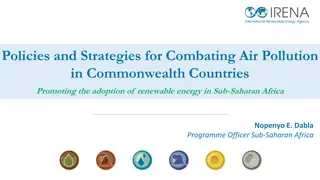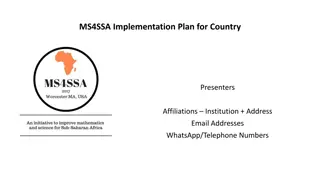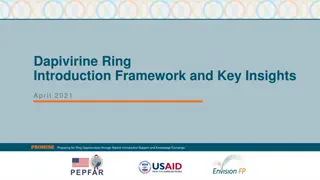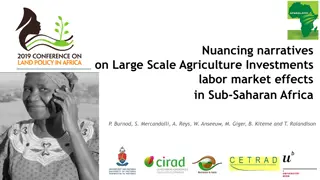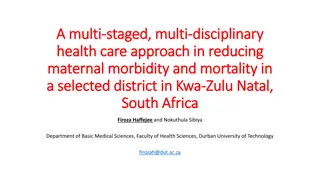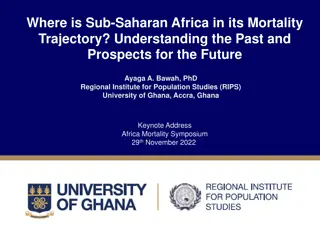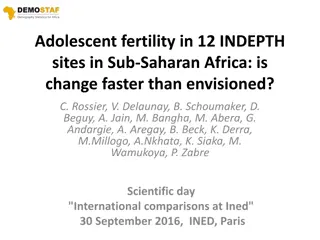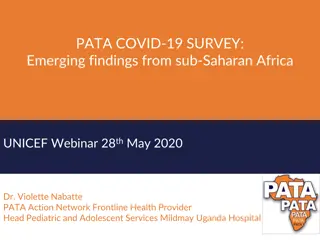Lessons from Sub-Saharan Africa in Tax Administration: Technology and Digitised Data
Technology adoption and digitisation of data in tax administration are key developments in Sub-Saharan Africa, with a focus on maximizing the use of data and technology to improve compliance. Initiatives like the DIGITAX Programme aim to produce evidence on utilizing digital financial services to strengthen tax administration. The DIGITAX Review Paper evaluates challenges and opportunities surrounding data and IT in low-income countries, offering insights for policy-makers and tax administrators.
Download Presentation

Please find below an Image/Link to download the presentation.
The content on the website is provided AS IS for your information and personal use only. It may not be sold, licensed, or shared on other websites without obtaining consent from the author.If you encounter any issues during the download, it is possible that the publisher has removed the file from their server.
You are allowed to download the files provided on this website for personal or commercial use, subject to the condition that they are used lawfully. All files are the property of their respective owners.
The content on the website is provided AS IS for your information and personal use only. It may not be sold, licensed, or shared on other websites without obtaining consent from the author.
E N D
Presentation Transcript
Technology and digitised data in tax administration: lessons from sub-Saharan Africa Fabrizio Santoro Postdoctoral Fellow, ICTD/DS 19thApril, 2021, NGF Technology and Tax Event International Centre for Tax and Development International Centre for Tax and Development www.ictd.ac www.ictd.ac
Background Technology adoption and digitisation of data in tax administration are key recent developments in LICs Very little research on this, in contrast with PFM literature (WB, 2016) Is data used to its full potential? Does technology work to improve compliance? .... Increasing availability of administrative data for research Growing literature based on these data (Mascagni 2017, Slemrod 2019) ICTD researchers have pioneered the use of admin data for research in Africa We learned a lot on data and technology International Centre for Tax and Development www.ictd.ac
DIGITAX Programme 3-year programme funded by Gates Produce robust evidence on the linkages between digital financial services and tax administration Component 1: design taxation of DFS, especially mobile money Component 2: potential of data and IT to strengthen tax administration Influence national policies, inform the global debate, assist revenue authorities Target audience: (i) policy-makers and regulators, (ii) donors, (iii) DFS providers, (iv) researchers Recently launched call for proposals (deadline April 18) International Centre for Tax and Development www.ictd.ac
DIGITAX Review Paper Objective: take stock on what we know on challenges with data and IT in LICs Update the latest review from Bird and Zolt (2008), identify gaps, draw key lessons Synthetize evidence for policy-makers, inform the digital journey Perimeter of the review: Data practices: availability, quality, consistency, accessibility, cross-checking Implementation and uptake of technologies Methods: Review of the literature from LICs Original research Assessment of quality of admin data from selected countries In-depth interviews with tax administrators International Centre for Tax and Development www.ictd.ac
Tech solutions won t work unless we get the basics right first. International Centre for Tax and Development International Centre for Tax and Development www.ictd.ac www.ictd.ac
Broader Findings Key issues with basics of data Coverage is incomplete, missing information Duplicates both in the registry and returns Information, when available, could be wrong or inaccurate Usage of data by tax administration for core functions Limited scope for using data for enforcement, risk and audit purposes repercussions on the ability to use third-party data as well Challenges in identifying, locating communicating with taxpayers Poor capacity to perform statistical analysis, forecasting to inform policymaking Many tasks are duplicated How does technology links to data quality? Multiple systems running in parallel, operating in silos, produce multiple datasets Paper- or excel-based databases co-exist with more integrated ones ITAS holds great promises but still lack of evidence Piece-meal technologies (e-filing, EBMs) can improve compliance but do not address core functions Cross-country International Centre for Tax and Development www.ictd.ac
International experience 1: Nil filing and expansion of the taxpayer registry in Rwanda References: Mascagni G., Mukama D, Santoro F., Hakizimana N. (2020) Active Ghosts: Nil-filing in Rwanda, ICTD Working Paper 106 (Research in Brief 55) How Clean is our Taxpayer Register? Data Management in the Uganda Revenue Authority (African Tax Administration Paper 12) Nil-Filing in Eswatini: Should the Revenue Authority be Bothered? (African Tax Administration Paper 12 and Research in Brief 44) How to Best Nudge Taxpayers? The Impact of a Tailored Letter Experiment in Eswatini, ICTD Working Paper 112(Research in Brief 57) International Centre for Tax and Development www.ictd.ac
Summary of evidence Background: majority of registered taxpayers in Rwanda don t file or file nil Research question: Why do taxpayers nil-file? How reliable is the taxpayer registry? Data: administrative data from registry and income tax returns Methods: RCT and qualitative analysis Key results: Nil-filing is a conscious behaviour Nil-filers are not easily nudged: responses to messages are small or null (as in Eswatini) Taxpayers are encouraged to register, but given little information on what to do next Confused taxpayers find ways to cope and minimise penalties International Centre for Tax and Development www.ictd.ac
Key messages 1. Reaping apparently low-hanging fruits can have unintended consequences, without adequate capacity to manage data Beware of the registration obsession (Moore, 2021) How can taxpayer registries be used for enforcement? Consistent with evidence from Uganda and Eswatini 2. Taxpayers find ways to cope with complexity that are not always efficient This further exacerbates issues with data quality International Centre for Tax and Development www.ictd.ac
International experience 2: VAT and Electronic Billing Machines in Rwanda References: Mascagni G., Mukama D, Santoro F. (2019) An Analysis of Discrepancies in Taxpayers VAT Declarations in Rwanda, ICTD Working Paper 92 (Research in Brief 34) Mascagni G., Dom R., Santoro F. (2020) The VAT in practice: evidence from Rwanda, ICTD Working Paper 117 (Research in Brief 66) International Centre for Tax and Development www.ictd.ac
Summary of evidence Background: VAT is a sophisticated tax that produces lots of data to improve enforcement, including from EBMs Research questions: Are these data fully exploited for enforcement? Does the VAT work in practice as intended? Data: administrative data from VAT returns and EBM (+ qual. data) Key results: Internal and external discrepancies are widespread in VAT data Taxpayers own records are inconsistent: 43% EBM = VAT declaration Buyers and sellers records are inconsistent: only 20% match, often buyer < seller Taxpayer confusion: compliance costs and practical problems with EBM International Centre for Tax and Development www.ictd.ac
Key messages 1. Administrative complexity and weak capacity prevent tapping the full potential of the VAT, related data and tech solutions Low hanging fruits left hanging: potentially > 100ml USD revenue gain Similar evidence from Uganda and Ethiopia (Almunia et al. 2020) In Federal contexts (Nigeria), States would benefit directly from VAT expansion 2. Tech solutions can increase compliance costs for taxpayers Mistakes are easy to make and difficult to rectify EBM, EBM2, and limited sophistication of small taxpayers 3. Problems with the data may prevent their use for enforcement International Centre for Tax and Development www.ictd.ac
Evidence from Nigeria: Taxpayers experience with digital tools References: Efobi U., Beecroft I., Belmondo T (2019) Small Business Use of the Integrated Tax Administration System in Nigeria, ICTD ATAP Working Paper 8 (Research in Brief 40) Mas ud A. (2019) Acceptability of e-Filing of Taxes by Micro-Enterprises in Northwestern Nigeria, ICTD Working Paper 96(Research in Brief 39) International Centre for Tax and Development www.ictd.ac
Evidence from Nigeria 1. SMEs uptake of ITAS (Efobi et al, 2019 paper & brief) Survey 485 SMEs in 7 States in SW Nigeria 40% aware of ITAS, but just 16% adopted it More sophisticated TPs use the system: higher education, finance degree, tax consultants Also, FIRS staff encouragement was key in adoption 2. Acceptability of State-level e-filing (Mas ud, 2019 - paper & brief) Survey 384 micro-enterprises in 7 States in NW Nigeria 70% acceptance intention albeit about half would need an intermediary Performance, effort and social expectancy are strong predictors of future adoption However, there is weak knowledge of e-filing hence the need of awareness, training International Centre for Tax and Development www.ictd.ac
Big progress made so far but potential of IT not fully tapped. International Centre for Tax and Development International Centre for Tax and Development www.ictd.ac www.ictd.ac
Concluding thoughts: common patterns Acknowledge success: great progress in limited time But... potential of data and tech far from being fully tapped IT alone is not enough other aspects that need to be right: Hard infrastructure, connectivity Institutional vision/strategy + broader digital reforms (IDs) The human factor in tax administration Demand side (taxpayers): Compliance costs, inefficiencies, inequalities, practical difficulties (TINs, EBMs) Know your customers first, prepare the ground, target and train International Centre for Tax and Development www.ictd.ac
Concluding thoughts: implications Feasibility and desirability of reaping apparently low hanging fruits Use data from DFS providers to expand the tax base or improve compliance Pre-filling returns or acting on discrepancies Careful consideration of local conditions Are the basics in place? What political and technical conditions are missing? Sequencing of reform: clean existing data before setting up an ITAS What are the possible unintended consequences? More evidence from Nigeria (Digitax) Share experiences from other countries + coordinate on local research proposals Support State-level initiatives through robust quant. evidence, scoping, field studies Pursue positive change in tax administration in the long run International Centre for Tax and Development www.ictd.ac
Thank you! Fabrizio Santoro Postdoctoral Fellow, ICTD/IDS f.santoro@ids.ac.uk International Centre for Tax and Development International Centre for Tax and Development www.ictd.ac www.ictd.ac
Cross-country Evidence Challenges with data Taxpayer registry Duplicates, wrong contact information, taxpayer identification challenges (Malawi, Sierra Leone, Uganda, Eswatini, Rwanda) hamper enforcement, tracking, service Flawed registration process (Rwanda, Sierra Leone, The Gambia) generates burden for RAs Tax returns data Missing information, inconsistencies, discrepancies (Uganda, Rwanda, SL, Ethiopia) Challenges with technologies Data management systems Multiple systems running in parallel (Malawi, SL, The Gambia) Online filing and payment Barriers to adoption (Nigeria, Zimbabwe, Caribbean) + administrative confusion (Nigeria, Kenya, Tajikistan) but positive impacts on compliance costs for adopters (Tajikistan) Electronic billing machines Revenue impact can be large (Rwanda, Ethiopia) but adoption can be costly (Kenya, Tanzania, Rwanda) back International Centre for Tax and Development www.ictd.ac
